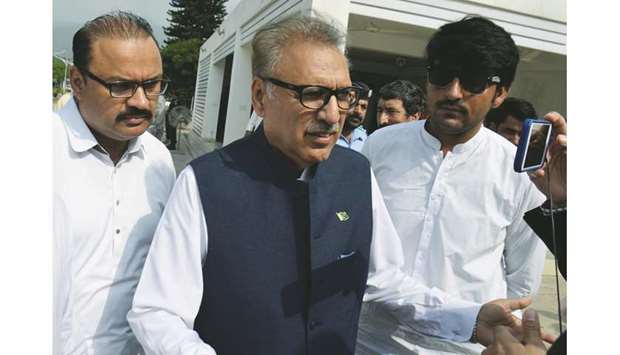Defending its decision of unilaterally nominate two members to the Election Commission of Pakistan (ECP), the federal government said President Dr Arif Alvi made the appointments in line with the Constitution and on the recommendations of the institutions concerned.
Federal Minister for Parliamentary Affairs Azam Khan Swati, through a video message, expressed his surprise over the refusal of Chief Election Commissioner (CEC) Justice (retired) Mohamed Raza to administer the oath of office to the appointees.
The ECP chief’s decision has been hailed by the opposition parties, which termed the government’s move “unconstitutional”.
A National Party (NP) leader even called for the trial of President Alvi and Prime Minister Imran Khan under Article 6 of the Constitution.
Raza had refused to administer the oath of office to the appointees on Friday, saying that their appointment was against the Constitution.
The two men, who were appointed by Alvi on August 22, arrived at the ECP headquarters to formally assume charge, but left dismayed.
Raza’s stance had been termed “unconstitutional” by Law Minister Barrister Farogh Naseem, who argued that the ECP chief had no authority to examine the validity of government notifications.
Alvi had issued notification of the appointment of Khalid Mehmood Siddiqui and Munir Ahmad Kakar as ECP members from Sindh and Baluchistan, respectively, after months-long deadlock between the government and the opposition over the issue.
Raza, in a letter sent to the ministry of parliamentary affairs, observed that the ECP members’ appointment was not in accordance with the relevant articles of the Constitution.
The ECP chief had cited a judgment rendered by a five-member bench of the Supreme Court in 2013, holding that the president did not enjoy discretionary power in appointment of the authority’s chief and members.
Raza made it clear that he would not administer oath to the “unconstitutionally” appointed members.
The parliamentary affairs minister said Alvi had appointed Siddiqui and Kakar in a “just and fair” manner and as an “impartial umpire” after failure of Prime Minister Khan and Opposition Leader Shehbaz Sharif to reach a consensus on the names.
Minister Swati said that even the parliamentary committee on the appointment of the election authority’s members had failed to break the deadlock.
He claimed that his ministry had informed National Assembly Speaker Asad Qaiser about the deadlock, and sought opinion from the law ministry before forwarding a report to the president with recommendations, in the light of which the president made the decision on the appointments.
Swati said there is no precedent under which the government could refer the matter to the chief justice of Pakistan for a final decision under Article 186 of the Constitution.
He said the government could not leave any institution “dysfunctional” under Article 215 of the Constitution.
Swati said the ECP had been incomplete at a time when the local elections in Punjab and Khyber Pakhtunkhwa were about to be held.
The minister said he had received a letter from Raza over the issue, adding that there had been no such precedent that such a letter had been written by an election authority chief.
Swati, however, did not elaborate on the future course of action, and concluded his message with the statement that they would make a “decision” keeping in view the background and to “strengthen the ECP”.
Meanwhile, National Party’s Punjab chapter president Ayub Malik alleged that the president and the prime minister had violated the Constitution and, therefore, they should be tried for “sedition” under Article 6 of the Constitution.
The two major opposition parties – the Pakistan Peoples Party (PPP) and the Pakistan Muslim League – Nawaz (PML-N) – have welcomed Raza’s stand, saying that the ECP had set an example by rejecting the unconstitutional move of the Pakistan Tehreek-e-Insaf (PTI)-led government.
The PPP’s parliamentary leader in the Senate Sherry Rehman said the procedure for ECP members’ appointment had clearly been defined in the Constitution, and that the government had violated the document.
She said the government had bypassed the opposition leader and the parliamentary committee on appointment of the ECP members.
Rehman said the ECP had upheld the Constitution’s supremacy by the decision.
Spokesperson for the PML-N Marriyum Aurangzeb regretted that the parliamentary committee on appointment of the ECP members had been ignored and that a one-sided decision had been taken.
She demanded that the government reverse its ‘unconstitutional’ decision.

President Alvi: appointed Siddiqui and Kakar in a ‘just and fair’ manner and as an ‘impartial umpire’, says Minister Swati.
